|
Mitzi's photo was taken during a romp in the snow, on the same occasion as Villain's (see post 29 May). She seems to be looking for Mum - but how? On this week's visit to the supermarket, there was a dog secured to a leash hook in the entrance, in the exactly the same stance as Mitzi in the photo looking out for her owner. I noticed how the dog's nostrils were twitching independently of each other. Sniffing Mum out I realised, thanks to a clearer grasp of a dog’s view of the world after re-reading Chapters 4 to 7 of Stanley Coren’s How Dogs Think for the next chapter of A Police Dog in the Family, that the dog was indeed looking out for her owner – but primarily using her nose. A dog not only has its owner's unique 'scent barcode' filed in its brain but it can gauge the direction the scent is coming from by comparing the scent strengths received through each nostril. It might sound far-fetched put like this, but I am certain that if the supermarket dog had jumped her lead, she would have found the person she sought far more quickly than a human whose dominant sense, like other primates, is vision. Dogs can smell scurf For skin to function like home-made cling-film, dead cells, scurf, are constantly being shed into the air from the skin surface and replaced by younger cells from the deeper layers. The rate is sufficient for scurf to be a major component of house dust and sufficient for dogs to pick up the trail by air scenting. Amazing. Source: How Dogs Think, Stanley Coren 2004. London: Simon & Schuster UK Ltd
0 Comments
- line from Longfellow's 1874 poem, The Hanging of the Crane - a ceremony in which a newly married couple's new cooking pot was suspended over a fire in their new home - referring to babies the couple would have 'speaking' with their eyes before they learn to talk. While making myself finish a chapter on PD Villain (see post 29 May A police dog in the family) after yet another of my approach-avoidance conflicts, I read Tom Whipple's newspaper report, Puppy dog eyes show who's master, on a scientific study attributing the dog's imploring look to a facial muscle that dogs have but wolves, their ancestors, don't. On the left you can see Tandy with her ball looking expectantly at the person coming towards her to play ball, ready to upgrade the look to imploring if the person doesn't immediately oblige. The photo on the right shows them having a break together afterwards. In their study, Kaminski et al state that 'mutual gaze between dogs and humans seems to trigger an increase of oxytocin [the love hormone] in both species' - analogous to the effect of the mutual gaze between human mothers and their newborn. 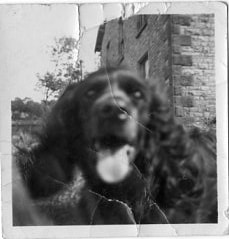 Puppy dog eyes For expressive eyes, spaniels like my dog Gipsy (see my post of 29 May) with big, wide-set eyes possibly have the edge on German Shepherd dogs like Villain and Tandy with near-set eyes in wolf-like faces - but all dogs are hard-wired for these 'puppy dog eyes', the result of selection during domestication based on humans' preferences (Kaminski et al). I once had a bookmark with a spaniel and the Longfellow quote although his poem refers not to a dog but to the children to come of a marriage being celebrated in a crane hanging ceremony. Sources: Maine Historical Society https://www.hwlongfellow.org/poems_poem.php?pid=155; Tom Whipple, The Times, Tuesday June 18, 2019; Juliane Kaminski and colleagues, June 17 2019 Evolution of facial muscle anatomy in dogs https://www.pnas.org/content/early/2019/06/11/1820653116 This is the title of my friend's 11-year-old grandson's school project on the 60th anniversary of the Normandy landings. 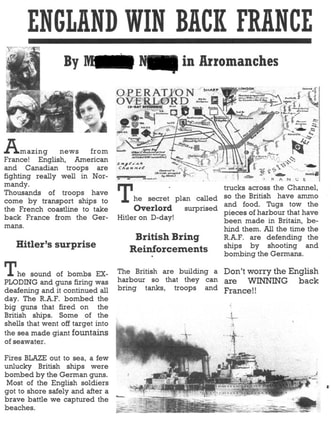 Front page piece - full of accurate information, its tone and over-optimistic title nicely convey the upbeat mood of the British news on D-Day. The Allies had hoped to recapture Caen within a day or two but it would take about a month after fierce fighting in St Pierre (see previous post) and elsewhere, and American losses were enormous beginning on Omaha beach on D-Day. Life back home - in the 1000 word story that follows, this 11-year-old boy paints in the New Milliennium a rich and accurate picture of the joys, sorrows, worries and excitement of life back home in WW2. Chapter 1 begins: 'People have been hoping there would not be a war, but it happened.' 'Dear Lord and father of mankind
Forgive our foolish ways' - Quaker John Greenleaf Whittier (for details of this hymn see blog post of 22 April) Mrs I.C., a D-Day veteran's widow, was speaking to me a few days before our trip to to the beaches in 2000, but I could find nothing on it then. I assumed that the many stories of capturing the beaches obscured the accounts of inland battles in Normandy, or one of us had made a mistake. But then I began to pick up a few references. 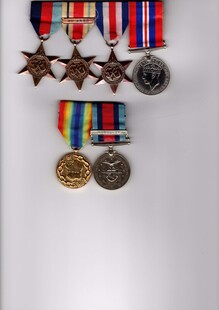 The D-Day veteran's medals including one from El Alamein The D-Day veteran's medals including one from El Alamein An extract from a recent source: "The story of the anti tank gunners at St Pierre is largely missing from accounts of the battle of Normandy. The fighting around St Pierre is one of the battles covered in the battlefield studies undertaken by the Cadets at the Royal Military Academy Sandhurst, but the anti tank gunners have not formed part of the story. They aren’t in the history of 8 DLI (Durham Light Infantry)." (www.theobservationpost.com/blog/?p=132). St Pierre was captured by the Allies on 8 - 9 June and recaptured on 10 June by the Germans who don't seem to have been keen on the enterprise: "Early this morning...We attacked a village…the artillery opened up...Oh, that certainly was not much fun…Then came a counter-attack…the enemy planes found us and the artillery fire came down on us again. We await further orders. Shall I have to go forward again? Thank God we are staying here overnight." (www.theobservationpost.com/blog/?p=132). The Allies re-captured St Pierre on 19 June, the same day as the storm that destroyed Mulberry A and damaged Mulberry B with 12 men missing (see previous post). One June many years later I was chatting to the D-Day veteran. In an echo of World War I veteran, Henry Allingham's words, he said: 'War is stupid.' Source (history, regiments and maps):
https://www.dday-overlord.com/en/battle-of-normandy/cities/saint-pierre My father spoke very little of being in the Normandy landings, mainly about being seasick on the way. Before we retraced his footsteps to liberated Holland, I'd filled in the gaps left from other sources with a trip to what was then the Public Record Office (PRO), since renamed The National Archives (TNA) - see first note in biro above). 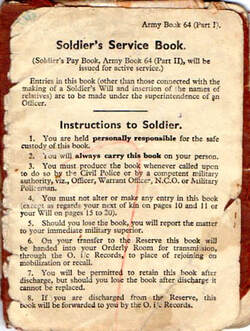 Visit to PRO, Kew There was far less available on the internet and we didn't have a computer then anyway hence the train trip to Kew for which I had to book an appointment. I navigated the initial personal ID checks with one lengthy setback due to a transcription error on someone's part (could have been mine!) concerning the documents I'd come to read. But when I got through to the readers' reception area brandishing Dad's Soldier's Service Book, they could not have been kinder. The rest of the visit was a blur of navigating between locker room, own reading space, cafe, toilet, any other department of the PRO making sure all the time you had the correct combination of items needed for each. Example:my pen and other items had to stay in the locker. Instead they gave you a free pencil to make notes. And with neither pockets nor handbag to keep my locker key in, I was in a constant panic over losing it, bordering on paranoia, and missing the train back. It was worth it. Document WO [War Office] 171/1084 has a note: 11.6.44 10.00. 127LAA [my father's unit]: 7 Phoenixes sunk 3 Corncobs in & sunk. These were parts of Mulberry B and there was a later note for the night of 11 - 12 June that there was 'no enemy air activity.' The enemy was the weather. On 19 June 1944 the worst storm in living memory irreparably destroyed 21 of the Phoenix caissons on Mulberry A on the US Omaha beach. On sheet 14 there is a laconic note by Lt Butterfield (127LAA): sinking of 1 Phoenix during storm. 12 men missing. I remember now how I felt guilt and relief that my father, who served on the Mulberry, got back. For a scientific but useful and watchable account of the Mulberry harbours and the storm by Professor Thomas Adcock and his former student Zoe Jackson follow this link:
www.ox.ac.uk/news/science-blog/storm-struck-mulberry-harbours "Poor ******s," said a US soldier on D-Day, seeing the slaughtered earlier arrivals on Omaha beach, "but at least they ain't seasick any more." I can't remember now where I read it but I've wondered on and off ever since whether he got back across the Atlantic. The late Bill Waddington, who got back to play Percy Sugden in Coronation Street, landed on Gold Beach on D-Day. He wasn't seasick, enjoying 4 tins of soup on the way because all his mates were too ill to eat. In his biography, Stafford Hildred's 1994 Percy's War, he says of them: "They were in quite a bad state. It was a wonder some of them could walk, let alone fight, when they got over." * With uncharacteristic insight, the military had anticipated the problem. They sought help - to no avail - from the medics helping to lay the foundations of the modern double blind clinical trial as the extract from this old textbook [with my parenthetical comments] shows: 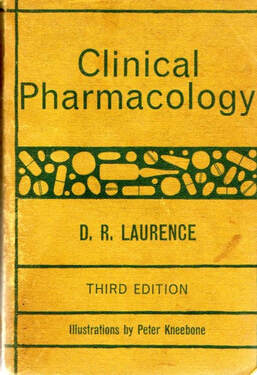 A textbook from my 1960s student days A textbook from my 1960s student days Whenever there was a prospect of sufficiently rough weather…soldiers were sent to sea in small ships, again and again, [my father once spoke of such an occasion] after being dosed with a drug or a dummy tablet and having had their mouths inspected to discourage attempts to dispose of the tablets by means other than swallowing. The ships returned to land after forty per cent of the soldiers had vomited. “On the whole the men enjoyed the trips”, [so that’s all right then] some of them, however, being soldiers, thought the pills were given to make them vomit [fitted my father] and some “believed firmly in the efficacy of the dummy tablets” [didn’t fit my father]. I found the most apt definition of 'backroom boys' in the Macmillan Dictionary: 'People who do important work in a private or secret way.' BACKROOM PEOPLE A massive success for the engineers You can see four remnants in Paul's photo of 115 concrete Phoenix caissons which had taken a couple of years to design and make. They were sunk between June 9th and June 15th to form the 1 mile long artificial harbour, Mulberry B, for landing troops and supplies until the French ports had been liberated. They had been towed across the Channel on the afternoon of D-Day after the soldiers, tanks, equipment and supplies had landed - without loss or damage from storms and rough seas. Weather prediction Meteorology in those days was still in its infancy, as bad, or worse than, the biological sciences, including medicine, for amassing sometimes conflicting evidence from a variety of clunky methods. I am long retired from a career in hospital Path Labs where we did blood tests 24/7, using in my early days equipment that was rudimentary by modern standards for deciding the patient's treatment e.g. emergency surgery. When making difficult decisions on treating the patient, the doctor depends on clearly communicated (careless transcription errors can cost lives) of competent measurements by reliable people - just as General Eisenhower's decision to make D-Day June 6th 1944 depended on the measurements of backroom people like Maureen Flavin. Three members of my family were in the Normandy landings: my cousin-in-law on D-Day, my father on D+4, and my stepfather on D+6. They got back. In gratitude to Maureen Sweeney for her exemplary dedication to duty which must have saved many lives like theirs, I have added this brief account of her inspiring story. 'Backroom person' Maureen Sweeney When 18-year-old Maureen Flavin, as she was then, got the job of postmistress at Blacksod, Co Mayo, on Ireland's Wild Atlantic Way she also became responsible for the 6-hourly readings of barometric pressure and temperature at the weather station. By June 1944, readings from various weather stations were giving conflicting readings but the Blacksod readings were accepted as the best guide to the weather in the Channel. At 1 am on June 3rd, her 21st birthday, she phoned her findings of a fall in pressure to the coastguard. It was transmitted to Group Captain Stagg, Chief Meteorologist, she was asked to confirm the findings and Eisenhower, without disclosing his reasons, decided not to risk invading on June 5th, restricting his choice to June 6th or 7th or delay for another fortnight. Maureen was asked to do hourly readings from then on. She says that she had no sooner got a reading made and sent than it was time to start on the next one [I can identify with that from Path Lab experience]. A June 4th reading showed a pressure rise indicative of better weather for June 6th, what would become D-Day. Maureen married Ted Sweeney, the lighthouse keeper, their son taking on the job after he retired. Sources (in addition to the RTE ONE Programme):
Imperial War Museum, https://www.iwm.org.uk/history/how-d-day-was-delayed-by-a-weather-forecast; Aidan Lonergan, www.irishpost.com/news/maureen-sweeney-meet-96-year-old-irish-woman-saved-thousands-lives-d-day-167788; Peter Crawley, www.irishtimes.com/culture/tv-radio-web/maureen-flavin-the-mayo-weather-woman-who-made-d-day-work-1.3917362 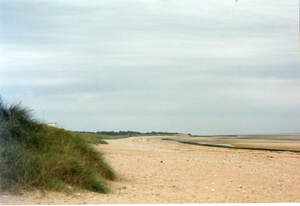 A peaceful Normandy beach September 2000 A peaceful Normandy beach September 2000 'At least the day was fine' - British D-Day veteran Joe Cattini. Probably still feeling seasick like the majority of the soldiers, thanks to choppy seas and a rectangular landing craft, he must have survived vicious metal beach obstacles (part of Rommel's Atlantic Wall) and being shot at by the enemy from the gun emplacements on the dunes and cliffs behind. Not 'flaming June'. June 2019 began cold, windy and wet with two inches of rain falling into the compost bucket outside our back door during the last 24 hours, getting us grumbling about putting winter jumpers on and having to switch the central heating on. Then I thought of the rain and gales of June 1944 in the English Channel, and my cousin surviving the landings on D-Day. (My cousin features in In Our Fathers' Footsteps (see books). NB: At present, Amazon are quoting a delivery delay of 1 - 3 months but you can buy either the PB from the publisher with a delay of about a week or the Kindle version through Amazon at 99p). General Eisenhower's experts had identified June 5th, 6th and 7th as possibles based on tide times and moon phases - later than that, the enemy may have seen through the fake installations around Dover and realised that the real plans were for Normandy landings not for Pas de Calais landings. Group Captain James Skagg was receiving readings from weather stations from Great Britain to as far away as Iceland and Greenland, and D-Day was postponed from June 5th to June 6th because of the threat of bad weather. DID EISENHOWER TRUST TO LUCK?
No, he didn't. Supporting evidence for his decision was aired on Irish TV (RTE1) at 10.15 pm on the 75th Anniversary of D-Day. Crucial barometric pressure and temperature readings taken at the Blacksod Weather Station, Co Mayo, by largely unsung hero, Maureen Sweeney (nee Flavin), now aged 96, were secretly passed on to Eisenhower's team on the orders of Eamon de Valera, Prime Minister of neutral Ireland. More on Maureen Sweeney's inspiring story in my next post Today's paper was full of them: I was five then and have only a jumbled set of memories.  The last time I would see my father before he left for Normandy was hearing him performing on stage at this concert as if on a cinema screen - so near to me yet so far away. And he would be for another two years. I remember Mum and I stayed in Scunthorpe for a couple of days with an engine driver, his wife and son, the same age as me. We had to sleep 'top and tail' and we got to see inside a steam engine and watch coal being fed to the boiler flames. The sadness was overwhelming but I had learned to keep my feelings to myself. The adults' attitude felt like 'Don't you know there's war on?' But only one thing matters and I will feel guilt to the end of my life about childhood self-pity: my father's unit arrived on D + 4 with less chance of getting killed, and he got back, didn't he, to the home that Mum had managed to maintain by going out to work. The older I get, the more I count my blessings. I've just begun work on the next chapter, 'How do they do it?' of A Police Dog in the Family. See post of 24 April for Police Dog Villain's first appearance here. A note on the next chapter It explains how Villain, the bold, intelligent German Shepherd dog was well suited to criminal work, and why Gipsy, my lovely, gentle Cocker Spaniel, may have been suitable for search and rescue work.
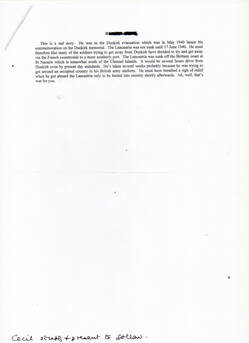 The British Expeditionary Force (BEF) The image is of a note I enclosed with Mum's birthday card about her neighbour's son, R (see yesterday's post). It tells something of three tragic evacutions which cost - among thousands of others - her neighbour's only son's life. 340,000 Allied troops had to be evacuated in Operations Dynamo (Dunkirk May 26-June4) which everyone's heard of, Cycle (Le Havre & other French ports ended 13 June) and Arial (St Nazaire 15-25 June). When I sent the note to Mum, I'd thought R & his friend had got to St Nazaire by 'every man for himself''. I was wrong: there was RAF fighter cover. But on 17 June after they'd embarked on HMT Lancastria at St Nazaire along with >5000 others - part of an intended convoy - the Luftwaffe bombed it with 3,500 lives lost including R's. Churchill had the the news suppressed in the public interest at the time and the emphasis has been ever since on the evacuations from Dunkirk. Sources (harrowing reading): Finest Hour (Hodder & Stoughton, 1999) by Phil Craig & Tim Clayton; Dunkirk2: The Untold Story ianhallauthor.blogspot.com/2016/07/dunkirk-2-untold-story-operation-cycle.html My note to Mum concludes:
'...He must have breathed a sigh of relief when he got aboard the Lancastria only to be hurled into eternity shortly afterwards. Ah, well, that's war for you.' 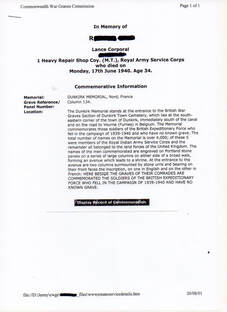 Commonwealth War Graves Commission (CWGC) website memorial Commonwealth War Graves Commission (CWGC) website memorial Mum would sometimes speak of her neighbour, the missing WW2 soldier's mother who had already lost her only daughter to meningitis. She'd clung to the hope for the rest of her life that her only son would get back. According to Mum, he and his friend had been on the Lancastria waiting to set sail when it was bombed. When his friend got back, after saying that they had both ended up in the sea he remained silent. Mum thought there had been some sort of cover-up. In August 2001, I looked him up on the CWGC website. He is commemorated on the Dunkirk Memorial to the Missing but his date of death is 17 June 1940, almost a fortnight after the evacuations from Dunkirk ended. There was more to the story that I was able to fill Mum in on before she died. It should appear in tomorrow's blog. - Royal British Legion Poppy PRESS 2008 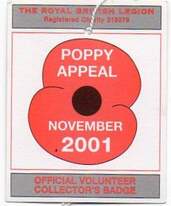 My first poppy collector's badge My first poppy collector's badge One of the first of many sad things I learned soon after joining the Legion in 2001 was how ex-service people are over-represented among the homeless. Many are affected by post-traumatic stress disorder (PTSD), a.k.a. shell-shock (WW1), battle fatigue (WW2), LMF (lack of moral fibre, RAF term, WW2) which can make them unlivable with and they end up lonely and homeless. The Legion helps in many ways from major projects on managing PTSD to turning lives around with measures which can be simple and inexpensive. 'God damn it, you've got to be kind.' - millionaire Eliot Rosewater, who spent his money on little acts of kindness in his town,
in Kurt Vonnegut's God Bless You, Mr Rosewater Title source: line from final stanza of 'There's No Silver Lining' in Aftermath (2014) - see blogs 21 & 22 May How are the above items connected? During World War 2, while Dad was in the British Liberation Army, Mum and I lived in Lancaster. Aged between 3 and 7 then, I used to wonder why there were so many men, with one trouser leg pinned up, sitting on the pavement outside the town centre shops. I don't remember ever asking why. Maybe I guessed that, hearing the adults' constant preoccupation with their own wartime problems, the answer would have been: 'Mind your own business and don't stare, it's very rude.'
Those men must have been some of the 28,000 British soldiers who had lost a leg in World War 1, their livelihood and more besides. They would have arrived by ambulance train from a south coast port. Well over 100 soldiers lost a limb in Afghanistan. This week, 20-26 May, is BLESMA, the Limbless Veterans (charity founded 1931) week. Follow this link to Joanna Bourke's history of the development of limb prostheses for war amputees in 'The Wounds of War': www.eastsussexww1.org.uk/wounds-war/ The British Legion, a charity, was founded in 1921 to meet the range of desperate needs of service people, war veterans and their families which the nation could not provide after such a costly war. My father joined in 1946 after he was demobbed from WW2. His badge is on the right of the image. I joined after visiting the Normandy beaches in 2000 when it had become the Royal British Legion (see badge on left of image). The Legion is still needed today because, as I once heard the late Avril Fearns, fellow Legion member and tireless poppy collector, put it: 'Politicians make war.' 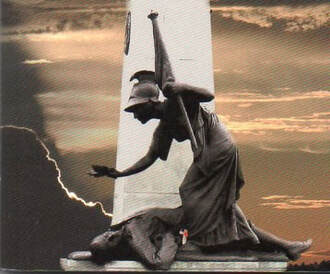 Words failed me yesterday while thinking of the unknown Punjabi soldier on an ambulance train who would not see his home again. The trains with their wounded occupants were extensions of the squalid Western Front, and nurses complained about the language barrier between them and their Punjabi patients. One nurse learned a little Punjabi, giving her patients the priceless comfort of hearing their mother tongue. Macclesfield war memorial, centrepiece of the front cover of In Our Fathers' Footsteps, 2018. A century on from the end of WWI, it shows Britannia honouring a fallen soldier against the background of a darkening sky and a black cloud with a silver lining.
|
AuthorIt's almost two years since I published In Our Fathers' Footsteps (see under BOOKS). My latest book, One Dog and His Cop, about my cousin's police dog,was published 30 November this year (see under BOOKS). Archives
September 2021
Categories |
All rights reserved. © Jenny Martin 2018


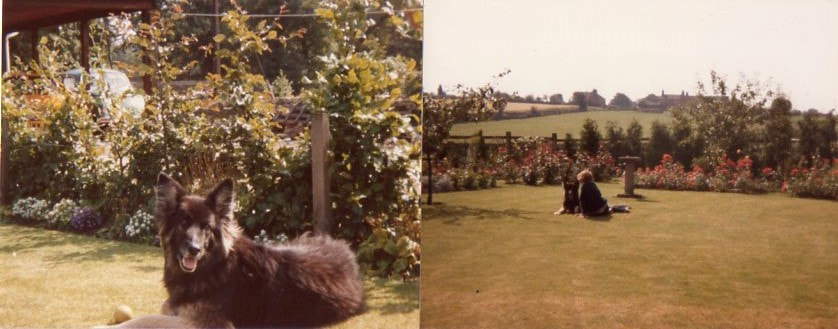
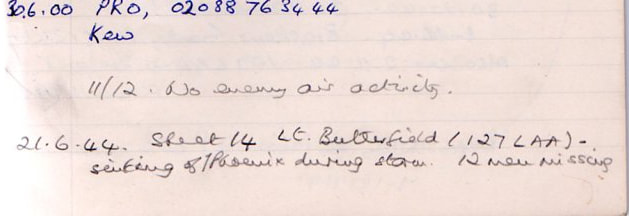
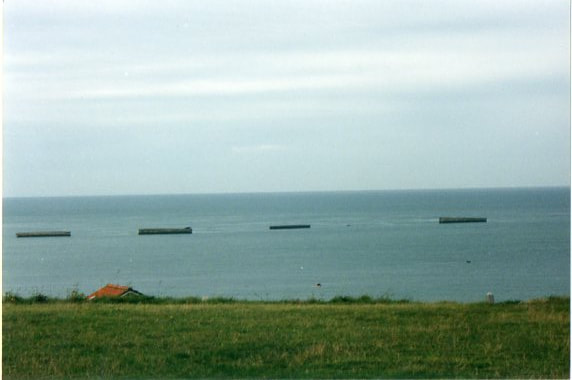

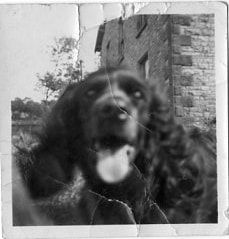

 RSS Feed
RSS Feed